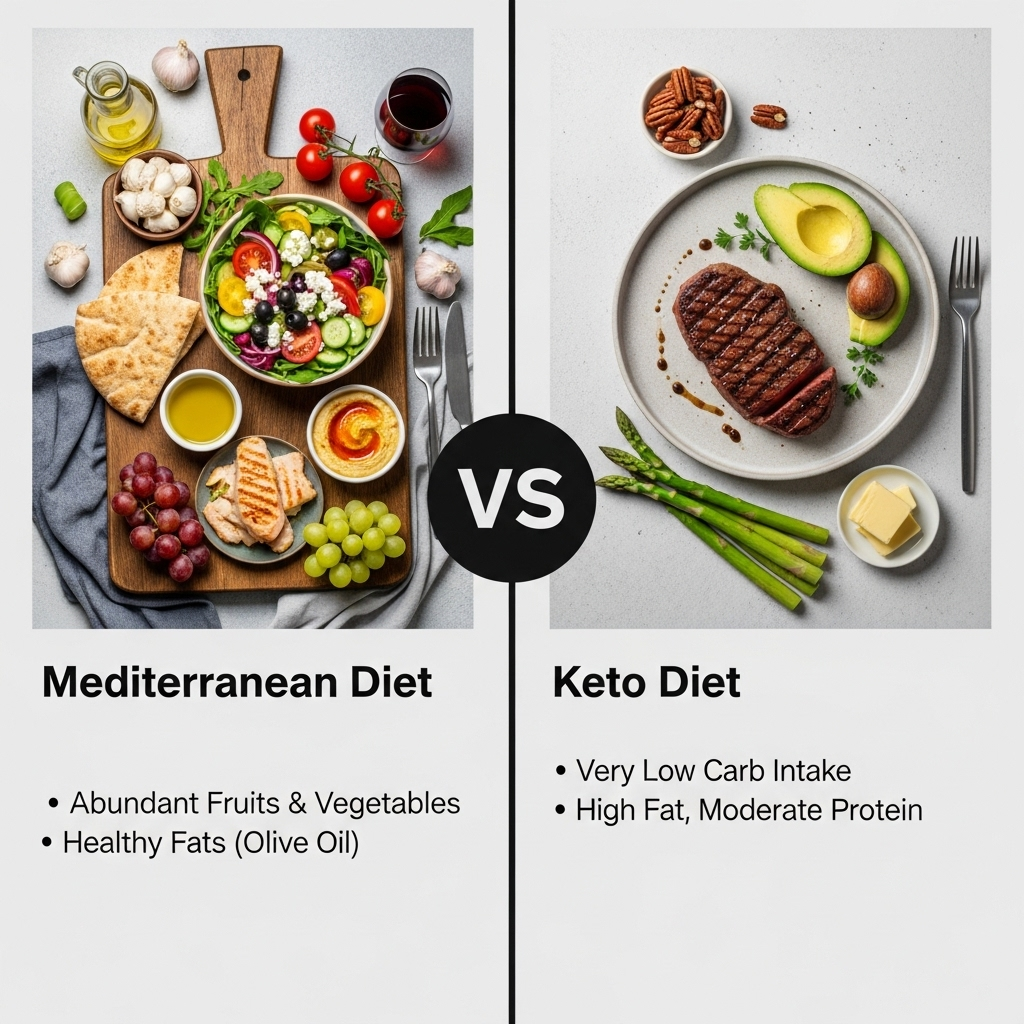Diets & eating plans: Mediterranean Diet vs. Keto Diet
Quick Verdict
The Mediterranean Diet is generally considered a healthier and more sustainable option compared to the Keto Diet, especially for long-term cardiovascular health and ease of adherence.
- Mediterranean Diet is easier to adhere to and more sustainable long-term.
- Both diets can be effective for weight loss and blood sugar regulation.
- Keto diet may have potential cardiovascular risks, while the Mediterranean diet is associated with better cardiovascular health.

Key features – Side-by-Side
| Attribute | Mediterranean Diet | Keto Diet |
|---|---|---|
| Macronutrient Ratio (Carbs/Fats/Protein) | Typically 45-65% carbohydrates, 10-35% protein, and 20-40% fat. Some studies show 50-60% carbohydrates, 15-20% protein, and 30% fats. | The standard ketogenic diet (SKD) typically consists of 70-75% fat, 20-25% protein, and 5-10% carbs. Other variations exist, such as a high-protein keto diet with a ratio of 60% fat, 35% protein, and 5% carbs. Some resources suggest an average of 70-80% fat, 5-10% carbohydrate, and 10-20% protein. |
| Ease of Adherence | Considered sustainable and easy to follow due to its diverse and delicious food options. It focuses on including certain foods rather than strict restrictions. | The keto diet can be difficult to maintain due to its stringent food restrictions. |
| Long-term Sustainability | Excels in long-term sustainability. Higher adherence is associated with a greater likelihood of maintaining weight loss. | Research suggests that the keto diet may not be the healthiest option to follow long-term. |
| Impact on Cardiovascular Health | Associated with better cardiovascular health outcomes, including reduced rates of coronary heart disease, ischemic stroke, and total cardiovascular disease. | Some studies suggest that keto diets may be linked to higher LDL cholesterol levels and an increased risk of heart disease and cardiovascular events. However, other studies have shown potential benefits on blood pressure, triglyceride levels, and HDL cholesterol. |
| Effect on Weight Loss | Can be as effective as other popular diets for weight loss, resulting in weight loss over a year. It also helps in preventing long-term weight gain and belly fat accumulation. | The keto diet can promote weight loss by boosting metabolism and reducing appetite. Some studies have found that people on keto diets lose more weight than those on low-fat diets. |
| Blood Sugar Regulation | Improves insulin sensitivity, reduces glucose levels, and decreases the risk of developing type 2 diabetes. It is rich in fiber and antioxidants, which improve insulin signaling. | The keto diet can help lower blood sugar and improve insulin sensitivity, which can be beneficial for people with diabetes and prediabetes. |
| Inflammation Reduction | Has anti-inflammatory properties. It is rich in antioxidants, trace elements, minerals, and vitamins that combat inflammation. | The keto diet may reduce inflammation by reducing insulin levels, promoting the synthesis of BHB (a ketone body), and increasing glucagon. |
| Cost of Implementation (food costs) | Switching from processed foods to fresh, nutrient-dense foods may slightly increase your grocery bill. | Keto-compliant foods like red meats and nuts can be costly. Keto-branded products like keto coffee and other supplemental products are also costly and may be unnecessary. |
Overall Comparison
Adherence: Mediterranean wins; Cardiovascular Health: Mediterranean wins; Weight Loss: Both effective; Sustainability: Mediterranean wins
Pros and Cons
Mediterranean Diet
Pros:
- Diverse and delicious food options
- Focuses on including certain foods rather than strict restrictions
- Associated with better cardiovascular health outcomes
- Effective for weight loss
- Improves insulin sensitivity
- Reduces risk of type 2 diabetes
- Associated with slower cognitive decline
- Reduces risk of mild cognitive impairment (MCI) or Alzheimer's disease (AD)
- Has anti-inflammatory properties
Cons:
- Switching to fresh foods may increase grocery bill
- Possible weight gain from high fat intake (olive oil, nuts)
- Potential lower levels of iron or calcium
- Some individuals may experience gastrointestinal side effects like bloating due to the high fiber content
Keto Diet
Pros:
- Weight loss
- Improved blood sugar control
- Reduced inflammation
Cons:
- Increased LDL cholesterol
- Heart disease
- Nutrient deficiencies
- Kidney stones
- Constipation
User Experiences and Feedback
Mediterranean Diet
What Users Love
- Easy to incorporate into daily life due to the availability of recipes and meal plans
- Provides sustained energy due to complex carbohydrates and healthy fats
- Helps reduce levels of harmful cholesterol and lower blood pressure
Common Complaints
- No major complaints reported.
Value Perception
- No value feedback reported.
Keto Diet
What Users Love
- No highlights reported.
Common Complaints
- No major complaints reported.
Value Perception
- No value feedback reported.